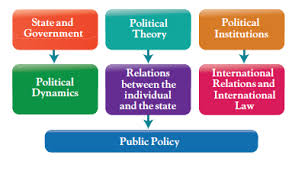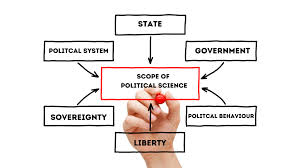Political science is a dynamic and multifaceted field that delves into the study of governance, political systems, and public policies. It encompasses various subfields, interdisciplinary connections, and real-world applications that contribute to a deeper understanding of political phenomena and their implications. We’ll discuss in this article about scope of political science.
Introduction to Political Science
Definition and Scope
Political science, as an academic discipline, revolves around the analysis of political behavior, institutions, and power dynamics within societies. It seeks to comprehend the processes through which governments operate, decisions are made, and policies are formulated and implemented.
Importance in Society
The study of political science holds significant relevance in understanding the functioning of democratic institutions, the dynamics of power relations, and the complexities of global politics. It equips individuals with the knowledge and skills necessary to engage critically with political processes and contribute to informed decision-making. We’ll discuss in this article about scope of political science.
Subfields of Political Science
Comparative Politics
Comparative politics involves the systematic comparison of political systems, structures, and behaviors across different countries and regions. It seeks to identify patterns, trends, and variations in political phenomena, thereby providing insights into the diverse forms of governance and political dynamics worldwide.
International Relations
Worldwide relations center around the cooperation between states, non-state entertainers, and global associations in the worldwide field. It examines issues such as diplomacy, conflict resolution, globalization, and international cooperation, shedding light on the complexities of global governance and the pursuit of peace and security. We’ll discuss in this article about scope of political science.
Political Theory
Political theory delves into the philosophical foundations of politics, exploring concepts such as justice, equality, freedom, and democracy. It engages with classical and contemporary thinkers to analyze and critique political ideologies, systems of governance, and the normative principles that underpin them.
Application in Governance and Policy
Political Institutions and Systems
Political science provides insights into the functioning of political institutions, such as legislatures, executives, and judiciaries, as well as the electoral processes and mechanisms of representation. It examines the role of these institutions in shaping public policy and governing societies. We’ll discuss in this article about scope of political science.
Policy Analysis and Implementation
Political scientists engage in policy analysis to evaluate the effectiveness, efficiency, and equity of public policies and programs. They assess the socio-economic impacts of policy decisions, analyze policy alternatives, and offer recommendations for improving governance and addressing societal challenges.
Scope of political science

The scope of political science encompasses the study of politics, governance, and power dynamics at local, national, and international levels. Political science delves into various aspects of political systems, including institutions, processes, ideologies, and behaviors, to understand how societies are governed and how decisions are made. It examines the structures and functions of government, the distribution of political power, the formulation and implementation of policies, and the interactions between different political actors, such as elected officials, interest groups, and citizens.
Furthermore, political science explores broader themes such as political philosophy, comparative politics, international relations, and public administration. It seeks to analyze and interpret political phenomena, identify patterns and trends, and develop theories and frameworks to explain political behavior and outcomes.
The scope of political science extends beyond academia to encompass practical applications in areas such as public policy, diplomacy, advocacy, and governance. Political scientists may work in various roles, including as policymakers, analysts, researchers, educators, and consultants, contributing valuable insights and expertise to address complex political challenges and advance the common good.
Overall, the scope of political science is vast and multifaceted, offering valuable insights into the functioning of political systems and their impact on societies, individuals, and the world at large. It provides a foundation for understanding and engaging with politics in all its complexity, making it a vital field of study for those interested in shaping the future of governance and society.
Interdisciplinary Connections
Relationship with Economics
Political science intersects with economics in areas such as public finance, economic development, and regulatory policies. The integration of economic theories and methods into political analysis enhances our understanding of how economic factors influence political outcomes and vice versa. We’ll discuss in this article about scope of political science.
Intersection with Sociology
Political science shares common ground with sociology in studying social structures, group dynamics, and collective behavior. Sociological perspectives enrich political analysis by examining the social foundations of power, identity politics, and the role of social movements in shaping political change.
Challenges and Future Prospects
Evolving Nature of Politics
Political science faces the challenge of grappling with the evolving nature of politics in an increasingly complex and interconnected world. Technological advancements, demographic shifts, and global crises pose new challenges and opportunities for political inquiry and action. We’ll discuss in this article about scope of political science.
Technological Advancements
The advent of digital technologies has transformed political communication, participation, and governance processes. Political scientists must navigate the implications of digital media, big data analytics, and artificial intelligence on political behavior, public opinion, and democratic norms.
Conclusion
In conclusion, the scope of political science is vast and diverse, encompassing the study of political phenomena at local, national, and global levels. By exploring its subfields, interdisciplinary connections, and real-world applications, political science offers valuable insights into the complexities of governance, policy-making, and societal change.
FAQs
- What is the scope of political science?
- Ans: Political science encompasses the study of governance, political systems, public policies, and international relations, among other areas.
- What are some subfields of political science?
- Ans: Subfields include comparative politics, international relations, and political theory, each focusing on different aspects of political phenomena.
- How does political science contribute to governance and policy?
- Ans: Political science provides insights into political institutions, policy analysis, and decision-making processes, informing governance and policy implementation. We’ll discuss in this article about scope of political science.
- What are some interdisciplinary connections of political science?
- Ans: Political science intersects with disciplines such as economics and sociology, enhancing our understanding of political dynamics and societal phenomena.
- What challenges does political science face in the future?
- Ans: Political science must adapt to technological advancements, evolving political landscapes, and global crises while continuing to address complex societal issues.

